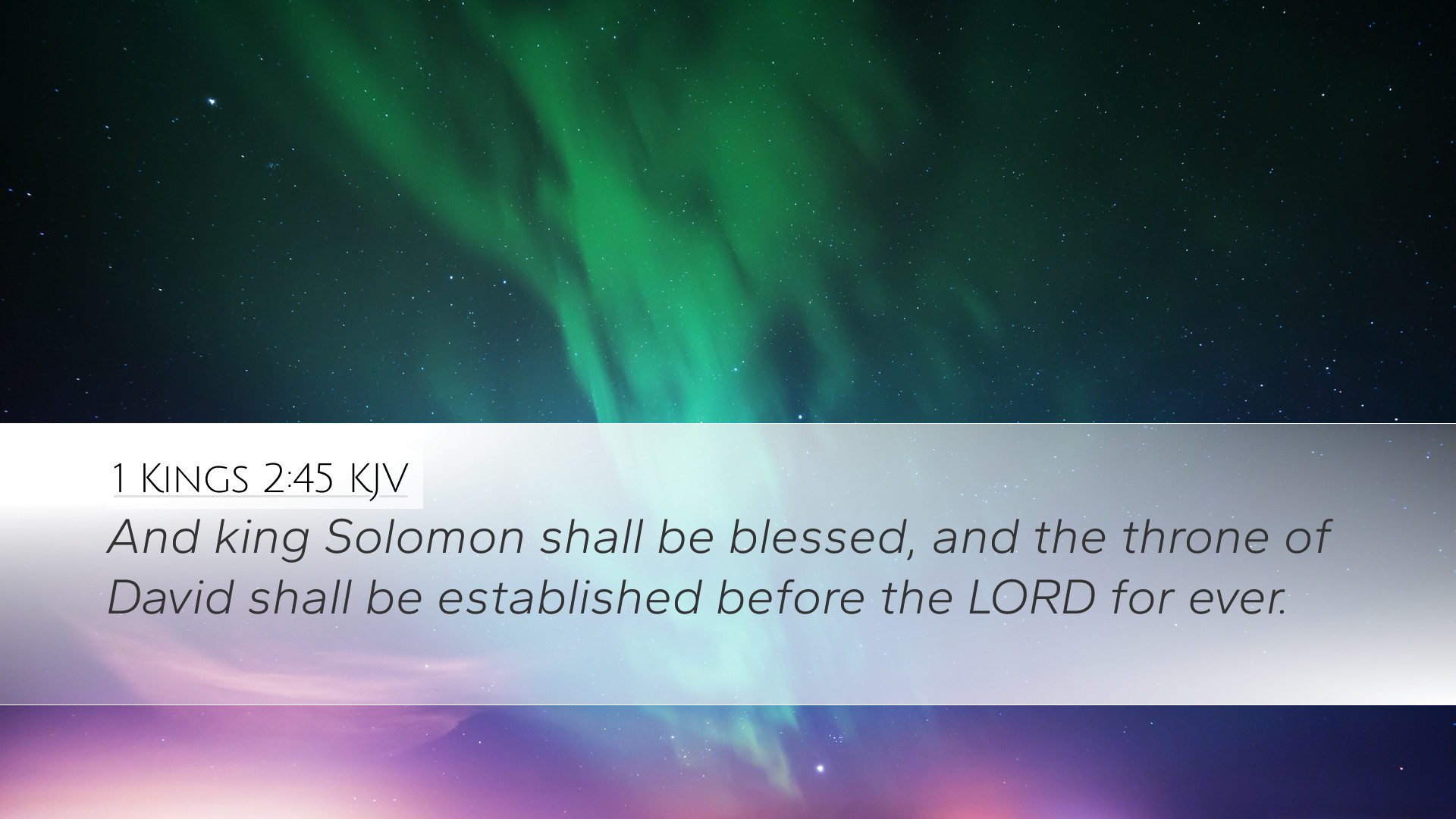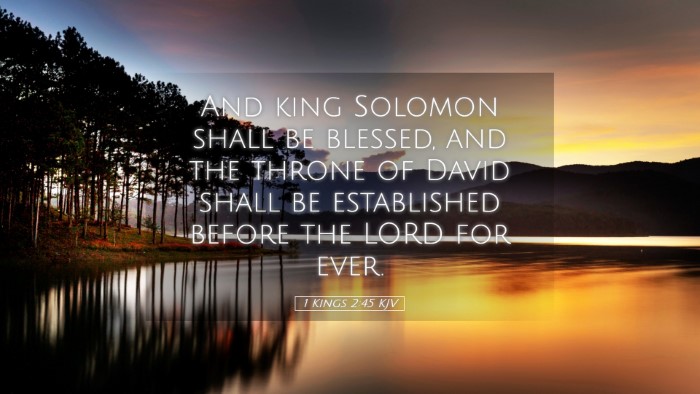Bible Commentary on 1 Kings 2:45
Bible Verse: "But King Solomon shall be blessed, and the throne of David shall be established before the Lord forever."
Introduction
This verse, nestled within the narrative of the succession of Solomon to the throne of Israel, reflects profound theological themes regarding the continuity of God's promises, the establishment of authority, and the fulfillment of prophetic words. It serves as a pivotal moment not only in the context of Israel's monarchy but also in the broader scope of biblical prophecy and the anticipated Messianic lineage.
Thematic Insights
-
The Divine Institution of Kingship
As noted by Matthew Henry, this verse emphasizes that Solomon's reign is not merely a human arrangement but rather a divine appointment. God's favor rests upon Solomon, and thus his kingship carries a weight of responsibility that aligns with the covenant made with David. Solomon's ascension is portrayed as a fulfillment of God's promise, not just to David but to the people of Israel.
-
The Enduring Throne of David
Albert Barnes highlights the significance of the throne of David being established "before the Lord forever." This proclamation assures the people of Israel that God's covenant with David is unbreakable. The stability of Solomon's reign signals God’s unchanging nature and His commitment to sustaining David's lineage. The notion of “forever” echoes through scripture, reinforcing the expectation of the Messianic King.
-
Solomon's Blessing
The promise of blessing upon Solomon is a critical element of this verse. As Adam Clarke notes, blessings in the biblical context often come with responsibilities and expectations. Solomon’s wisdom and adherence to God’s law are the conditions for the prosperity and longevity of his reign. This emphasizes a divine principle: kings are accountable to God, and their success hinges on their faithfulness to His commands.
Theological Significance
The implications of 1 Kings 2:45 extend beyond the historical context of Solomon's reign to encapsulate significant theological themes:
-
Covenantal Faithfulness
The mention of God's establishment of the throne calls attention to the enduring nature of His covenants. God's promises are not limited by time or circumstance, and this verse stands as a testament to His faithfulness throughout generations.
-
Messianic Expectation
The verse serves as an early declaration of the Messianic hope that would later be fulfilled in Jesus Christ. Future biblical revelations connect the lineage of David and Solomon to the promised Messiah, who would establish a kingdom that knows no end. This linkage is crucial for theological reflection on the nature of Christ's kingship and His fulfillment of the Old Testament promises.
Practical Applications
For modern readers—pastors, students, and scholars—this verse offers several practical insights:
-
Leadership Principles
Solomon's reign exemplifies the principles of godly leadership rooted in wisdom and divine guidance. Leaders in the church and community are encouraged to seek wisdom from God and adhere closely to His commands to ensure a blessed and fruitful ministry.
-
The Importance of Legacy
The emphasis on the enduring nature of David’s throne serves as a potent reminder of the legacies that leaders leave behind. The character and faithfulness of leaders can influence future generations, inviting contemplation on how current actions can affect long-term spiritual health.
-
The Call to Faithfulness
Believers are reminded that God's blessings are inextricably linked to faithfulness in following His decrees. The life of Solomon serves as both an inspiration and a warning about the highs and lows of a life rooted in or diverging from God’s will.
Conclusion
In summary, 1 Kings 2:45 encapsulates significant theological truths regarding divine authority, the faithfulness of God’s covenant, and the projections of Messianic hope. Through the commentary of the historic biblical scholars such as Matthew Henry, Albert Barnes, and Adam Clarke, we glean insights that are both doctrinally rich and practically relevant for today’s church leaders and laypersons alike. This verse invites deep reflection on the responsibilities of leadership, the nature of God’s promises, and the eternal establishment of His kingdom.


